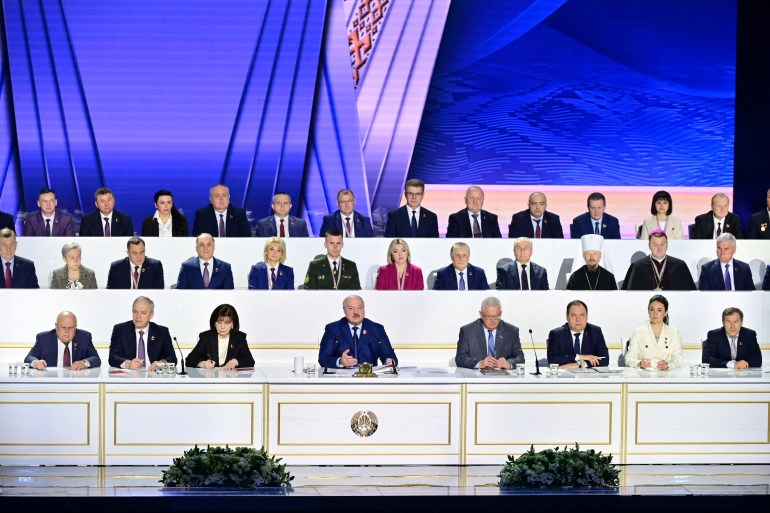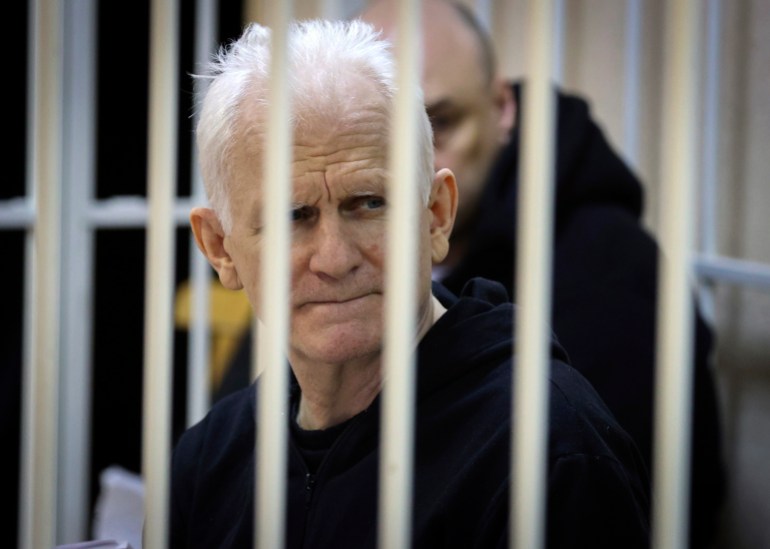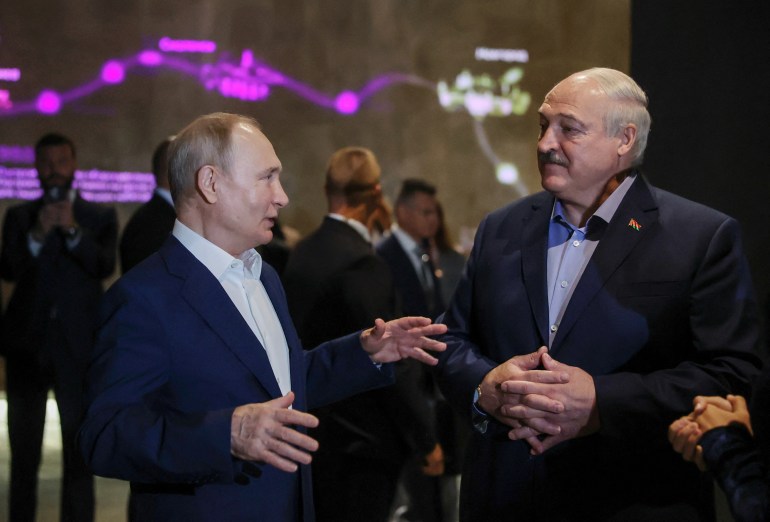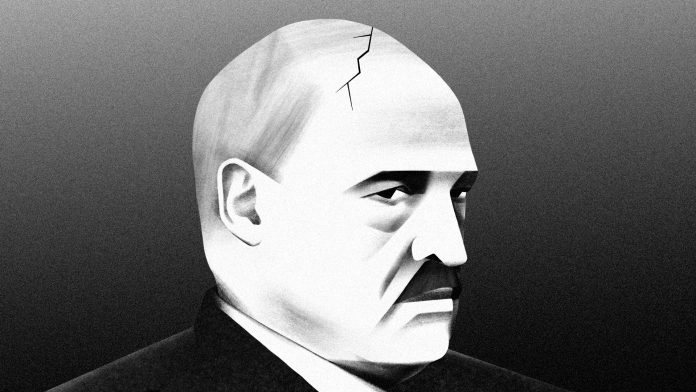On January 26, Belarusians will cast their ballots in a presidential vote. Officially, there are five candidates, but 70-year-old Belarus President Alexander Lukashenko, who has ruled the country for more than three decades, will almost certainly retain his seat.
While Vladimir Putin’s Russia tolerated a degree of open dissent, at least until the invasion of Ukraine, Lukashenko was described for many years as “Europe’s last dictator” – a reputation which didn’t seem to faze him.
“I am the last and only dictator in Europe. Indeed, there are none anywhere else in the world,” he told Reuters in 2012.
Belarus’s opposition, the United States, the European Parliament and rights groups have dismissed the upcoming vote as a “sham”. The last presidential elections in 2020 kicked off mass protests amid widespread allegations of vote rigging, followed by a brutal crackdown by the authorities.
Experts and insiders say Lukashenko is driven by a “thirst for power” and, having been shaken by those demonstrations, the fear of losing control.
“This desire for power has been driving him for 30 years. It does not let him relax for a second,” Valery Karbalevich, a political observer at Radio Liberty and author of an unofficial biography of Lukashenko, told Al Jazeera. “Power and life are the same thing … and he does not imagine his life without power.”
Born in 1954 in the town of Kopys in northern Belarus, Lukashenko, a self-confessed troublemaker at school, was a Soviet pig farm manager before becoming president. The leader, who at times has made outlandish claims such as vodka and visits to the sauna being able to prevent COVID, is ruthless and distrustful, observers and those who worked under him say.
“This man is capable of giving an order to kill if someone goes against him,” said Pavel Latushka, Belarus’s now-exiled former minister of culture from 2009 to 2012.
“I had a conversation with him where he told me directly: ‘If you betray me, I will strangle you with my own hands.’ He later repeated this publicly in a recent [2024] interview with Russian propagandist Vladimir Solovyov.”
As Belarus heads to the polls on Sunday, who is the man behind the leader and what motivates him today?
Soviet nostalgia
Belarus, a landlocked nation of a little more than nine million bordering Russia, Ukraine, Poland, Latvia and Lithuania, was once part of the USSR. Like many leaders of former Soviet republics, Lukashenko’s political career began during that period. Unlike them, however, Lukashenko did not embrace nationalism and was the only lawmaker in Soviet Belarus to vote against his country’s independence in 1991.
Nostalgia for the Soviet era is reflected in much of Lukashenko’s governance.
“He lived in the Soviet Union for more than 30 years and now, he cannot go beyond that life experience,” said Karbalevich.
Lukashenko, then 39, won Belarus’s first, and so far only, presidential election deemed free and fair by outside observers in 1994. The independent candidate ran on a populist platform, pledging to root out corruption and railing against the “lawlessness” which he said held the country “hostage”. Immediately post-independence, Belarus suffered from a stagnating economy, corruption, inflation and racketeering gangs.
While it is difficult to pinpoint when exactly Lukashenko developed distrustful tendencies, or whether he always had them, he survived an assassination attempt on the campaign trail when his car came under fire by unknown assailants. A state television documentary later claimed the attackers were working on behalf of high-ranking officials.
Lukashenko won approximately 80 percent of the vote, defeating the country’s first prime minister, Vyacheslav Kebich, who inherited the job after independence and under whom quality of life had deteriorated.
Within a year of assuming office, Lukashenko held a referendum that changed Belarus’s white-and-red flag to one closely resembling the old Soviet design. He told World War II veterans, “We have returned to you the national flag of the country for which you fought.”
He maintained a planned economy, with state monopolies over industry and kept the collective farms open, winning the loyalty of the agricultural sector. This state-run economy prevented the emergence of powerful oligarchs dominating national politics, unlike in Russia and Ukraine, although a handful of businessmen with links to the government have prospered in recent years.
“At the beginning of his presidency, he was really popular,” explained Karbalevich.
“He considered himself the people’s president and told different stories about how the public loved him.”
At a meeting of government officials in 2006, for example, Lukashenko boasted how bedridden war veterans practically stood up to make their way to voting booths.

‘Afraid to look him in the eye’
Karbalevich believes that back then, Lukashenko had a vision and wanted to go down in history as the man who “created the Belarusian statehood” and an alternative model to post-communist transition in other countries, but he also wanted the state to control the economy.
To an extent, it proved efficient: unlike Russia, which was plagued by poverty and organised crime in the 1990s, Belarus was relatively safe and the inequality gap was narrow. The country’s Gini coefficient – a wealth inequality measure – has maintained a better balance than its neighbours and even parts of Western Europe.
Throughout, Lukashenko has tried to cultivate an affectionate, paternalistic image as “Bat’ka” – the father of the nation. He’s regularly photographed taking part in “subbotnik” – the Soviet practice of undertaking unpaid volunteer work on the weekends – for instance, by helping out on a farm. He enjoys sport and fitness, and projected an image of a strong, healthy leader by playing hockey.
“Lukashenko enjoys evening events,” said Latushka, who worked directly under the president during his time as a minister.
“He gathered key officials, journalists, sports and cultural figures for closed parties on New Year’s, on the traditional Old New Year [January 14]. At first, there was an open part, and later a closed one, which could last until 6, even until 7 in the morning, with a concert programme in a Stalinist style when everyone sits at the table and watches the artists. Lukashenko can drink at such events – even a lot, and then he can even go dancing. This is a part of his life hidden from society.”
But another aspect of Lukashenko’s leadership quickly became apparent early in his rule.
“Fear. That is why officials sit with their heads down during meetings with him,” Latushka said.
“Everyone is afraid to look him in the eye. This is a paternalistic system of power. As soon as he leaves, everyone’s heads will rise, everyone will start talking and acting differently. In public, Lukashenko is outwardly a very cruel person, capable of publicly humiliating anyone. He does not take into account other people’s points of view.”

Consolidating power
Within two years of stepping into office, Lukashenko engineered a constitutional referendum giving him control over parliament and the security apparatus. The opposition alleged widespread voting fraud, although it’s also possible a part of the citizenry, wary of the instability in neighbouring Russia, was indeed willing to grant Lukashenko those powers.
Then in 2004, Lukashenko abolished presidential term limits through another such referendum, meaning he could stand for election again and again.
Uladzimir Zhyhar, a former detective and representative of Belpol, a group of exiled ex-Belarusian police officers who defected to the opposition after the protests of 2020, accused law enforcement of being, first and foremost, henchmen for Lukashenko’s regime.
“This is the system he has cultivated for 30 years,” Zhyhar told Al Jazeera.
“After the anti-constitutional referendum of 1996, the police, courts, prosecutor’s office, investigative committee and, of course, special services, obey [Lukashenko]. There is torture, there are illegal arrests, there are interrogations … and the main department for fighting organised crime, which if it concerns politically motivated crimes, they are allowed to do everything. Absolutely everything, regardless of human rights or anything else.”
Between 1999 and 2000, four of Lukashenko’s political opponents went missing (PDF): former Interior Minister Yury Zakharanka; lawmaker Viktar Hanchar and his friend, businessman Anatol Krasowski; and journalist Dzmitry Zavadski. An exiled member of an elite unit targeting gangs in 2019 admitted to taking part in three of their abductions and murders.
Lukashenko has appointed loyalists to senior positions, both within the security forces and state-run industries. But it seems that he does not fully trust them.
“Lukashenko absolutely hates people who can be in some position of authority, and so he is constantly engaged in the rotation of personnel,” Zhyhar explained. And while former security personnel may occupy deputy positions at enterprises, they are never – “as a rule” – appointed to top posts.
“He is afraid that this former security operative, having certain knowledge, having a certain authority, will be able to form connections and pose a threat to him.”

Between Moscow and the West
Early in his presidency, Lukashenko’s foreign policy echoed the old Soviet Union’s position during the Cold War. He railed against Western imperialism and travelled to Belgrade amid NATO bombing to support Serbia’s Slobodan Milosevic. He was also deeply invested in reintegration with Russia and in 1997 signed a Union State agreement with then-President Boris Yeltsin. Under terms which were never fully implemented, Russia and Belarus would have re-united.
“Lukashenko had a desire to unite with Russia into one state and to conquer it,” Karbalevich explained. “Then, in the 1990s, Boris Yeltsin was unpopular in Russia as a president. He was old and sick, and Lukashenko thought that he could defeat him at any democratic election. But then Putin came to power [in 1999], and Lukashenko lost interest in integration with Russia.”
The initial relations between Lukashenko and Putin were “very, very tense”, added Vladzimir Astapenka, who served as a Belarusian diplomat to several Latin American countries in the 2010s. “They were like competitors, and Putin did a lot to move Lukashenko back to where he belongs.”
Nevertheless, Lukashenko leveraged his position as one head of the nominal Union State to obtain concessions from Moscow. The Belarusian economy relied heavily on Russian subsidies of cheap oil, which was refined in Belarus and resold in Ukraine and the EU. Russia, meanwhile, imported vast quantities of Belarusian agricultural produce, such as milk and cheese.
Relations remained cordial but distant throughout the 2010s, with Lukashenko quietly embracing a more Belarusian identity, even giving a speech in Belarusian in 2014 instead of the customary Russian.
Still, Yauheni Preiherman of the Minsk Dialogue Council on International Relations think tank, says Lukashenko has been successful at handling his personal relationship with Putin and Minsk’s with Moscow. “I sometimes call him the best Kremlinologist in the world, because whether we like him or not, his unique access to Putin himself and the rest of the Russian political elite makes him a very knowledgeable statesman in that regard,” he explained.
At the same time, Lukashenko started reaching out to the West, for instance, in 2008 and 2015 ordering the release of political prisoners, after which the European Union (EU) in turn lifted some sanctions it had imposed over Belarus’s internal repression.
At the onset of the war in eastern Ukraine in 2014, Belarus positioned itself as a neutral mediator, with Lukashenko flip-flopping over the question of the Crimean Peninsula, annexed by Russia early in the conflict.
The story you usually find in the mainstream Western media is “Lukashenko, the last dictator of Europe, being only focused on ensuring his power inside the country. That makes him ideologically close to Putin, and that’s




